新概念第三册Lesson 41 Illusions of Pastoral peace讲义
文档属性
| 名称 | 新概念第三册Lesson 41 Illusions of Pastoral peace讲义 |
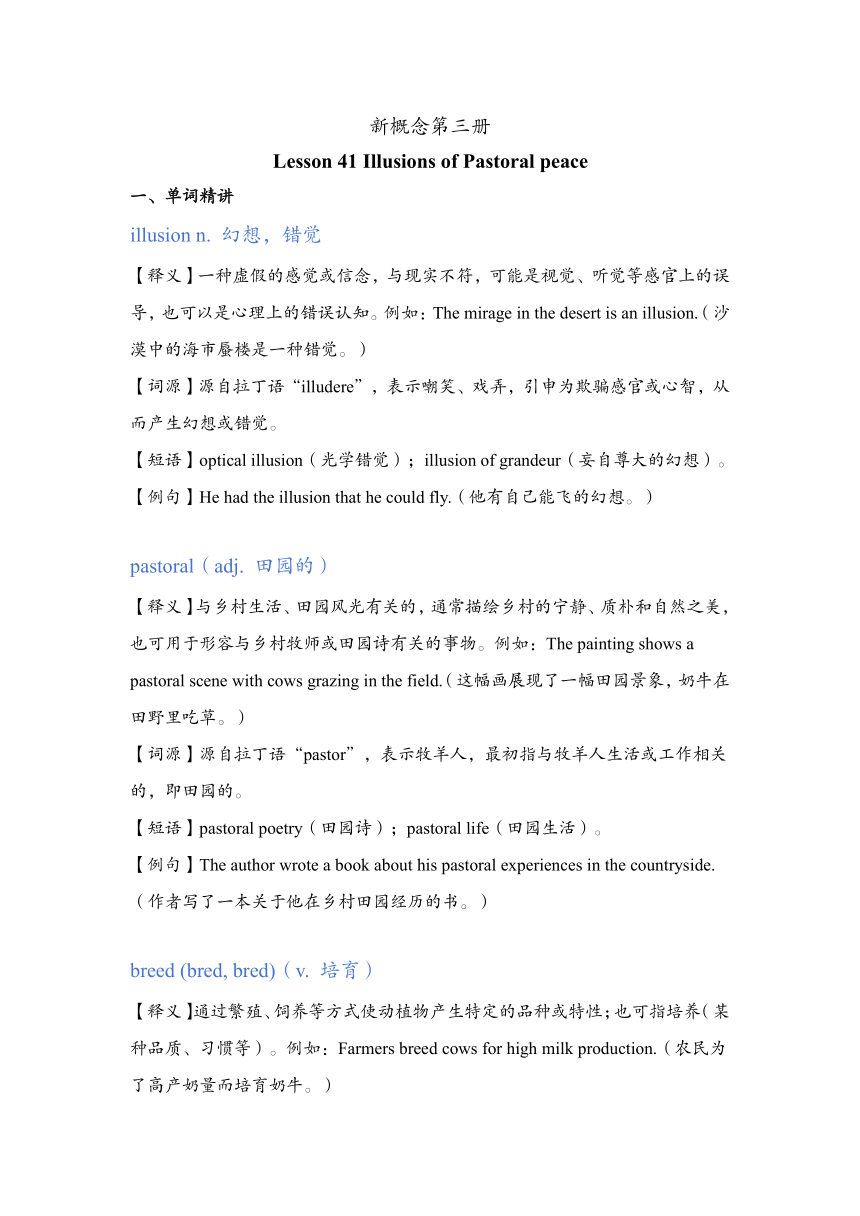
|
|
| 格式 | docx | ||
| 文件大小 | 495.8KB | ||
| 资源类型 | 教案 | ||
| 版本资源 | 新概念英语 | ||
| 科目 | 英语 | ||
| 更新时间 | 2024-12-05 00:00:00 | ||
图片预览

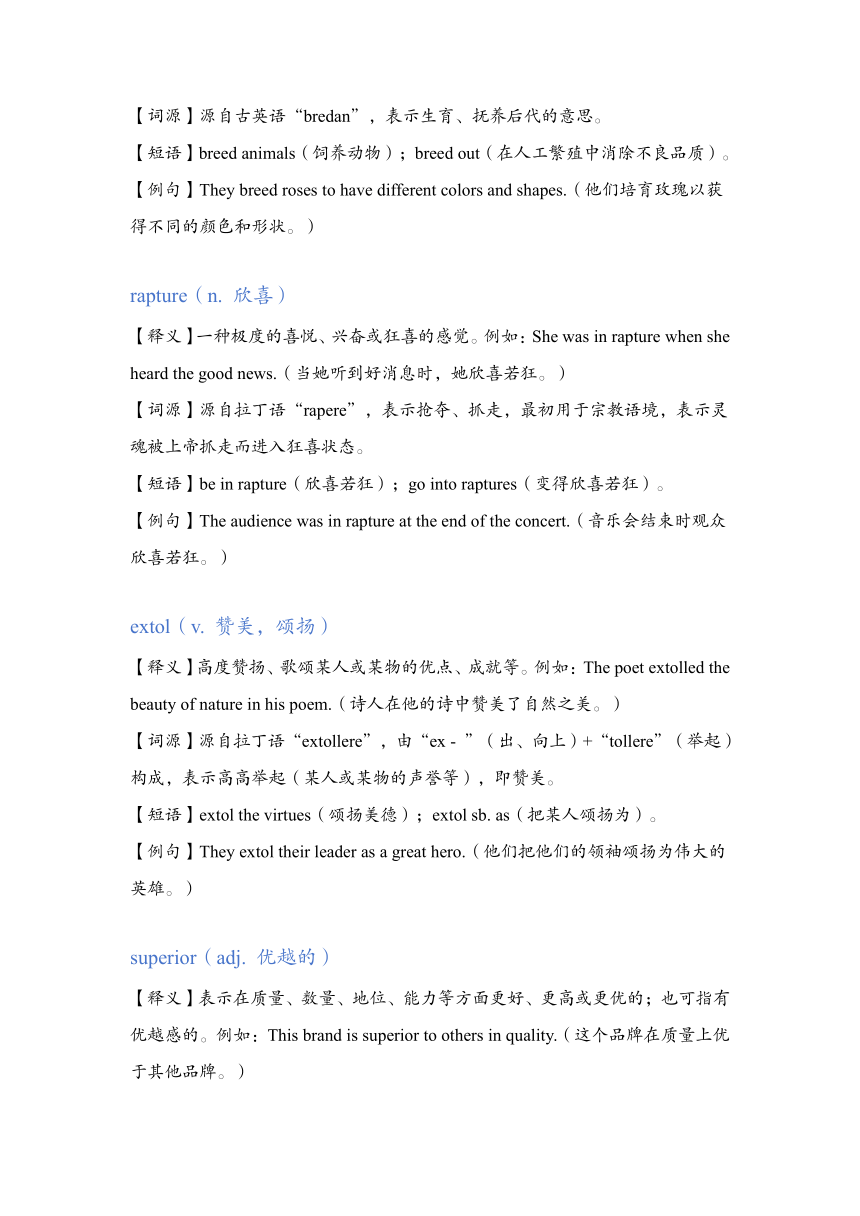
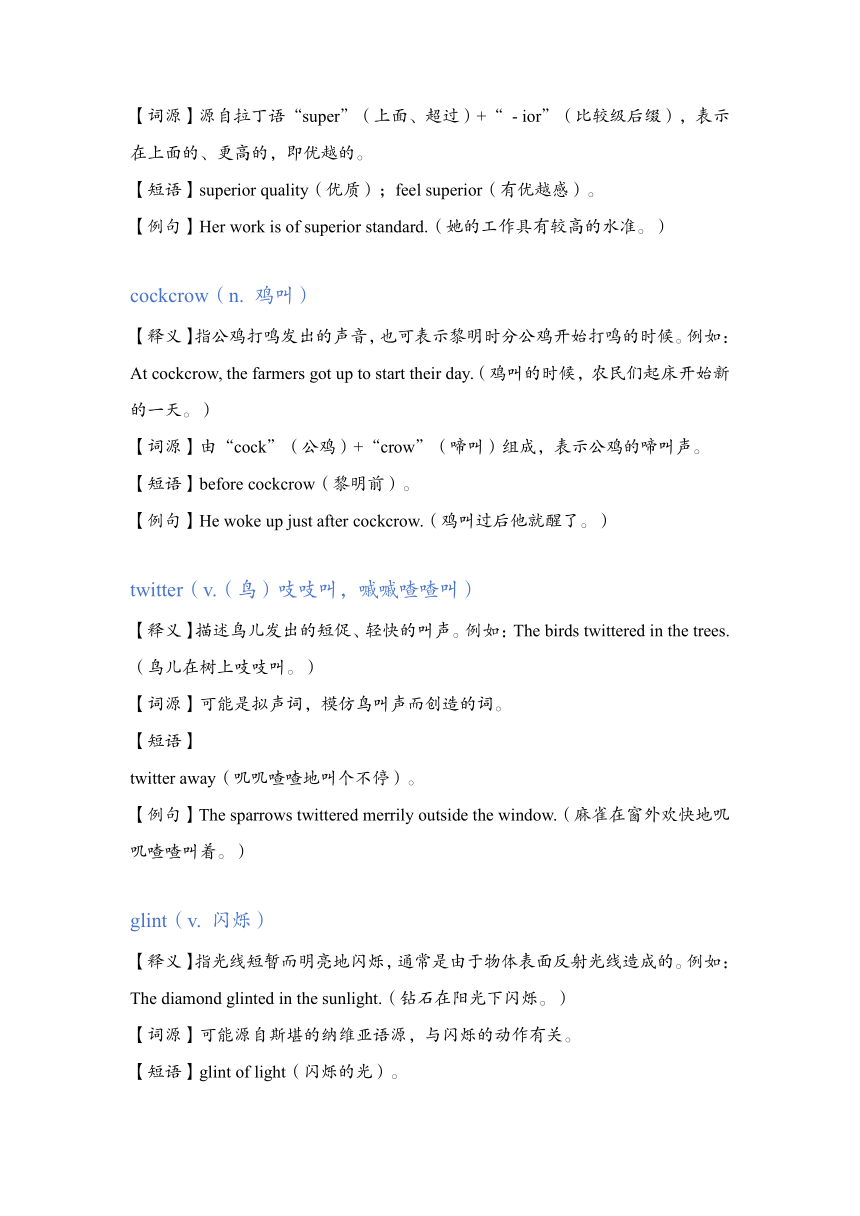
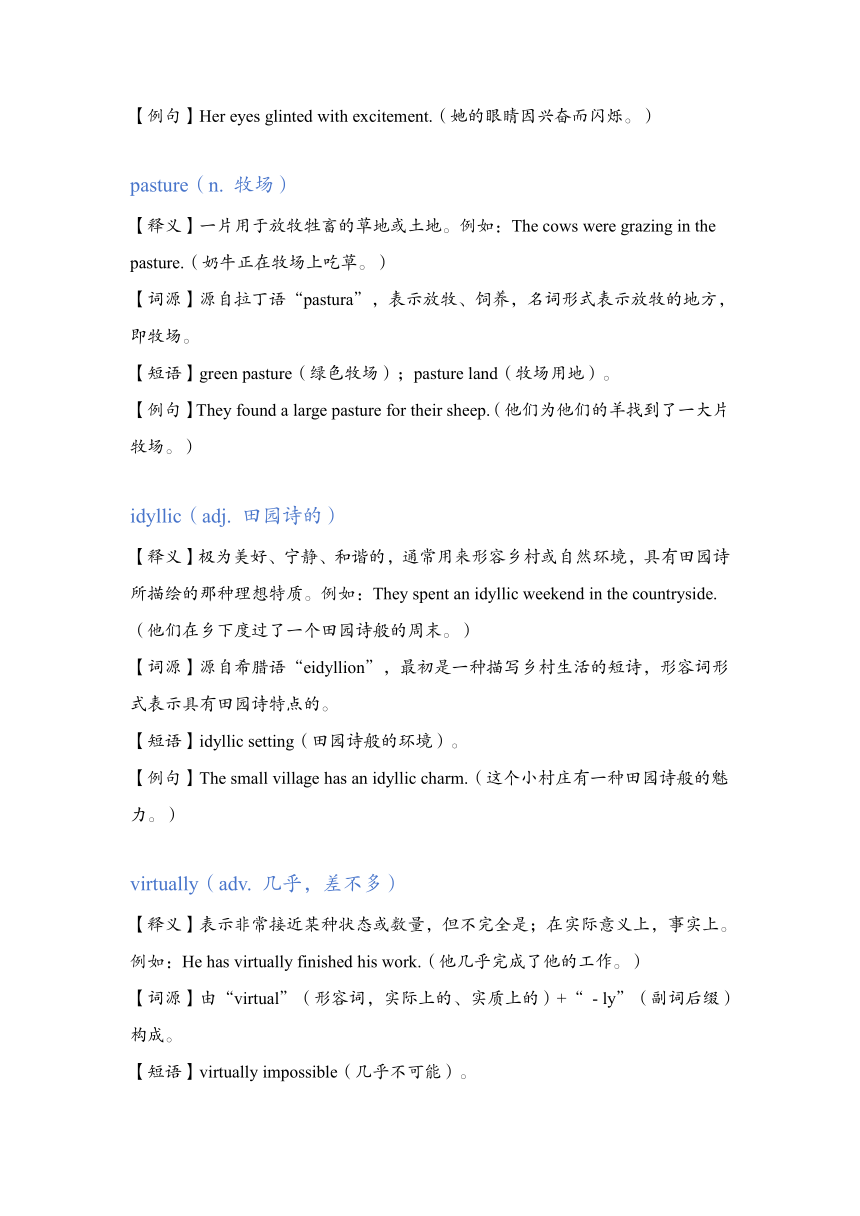
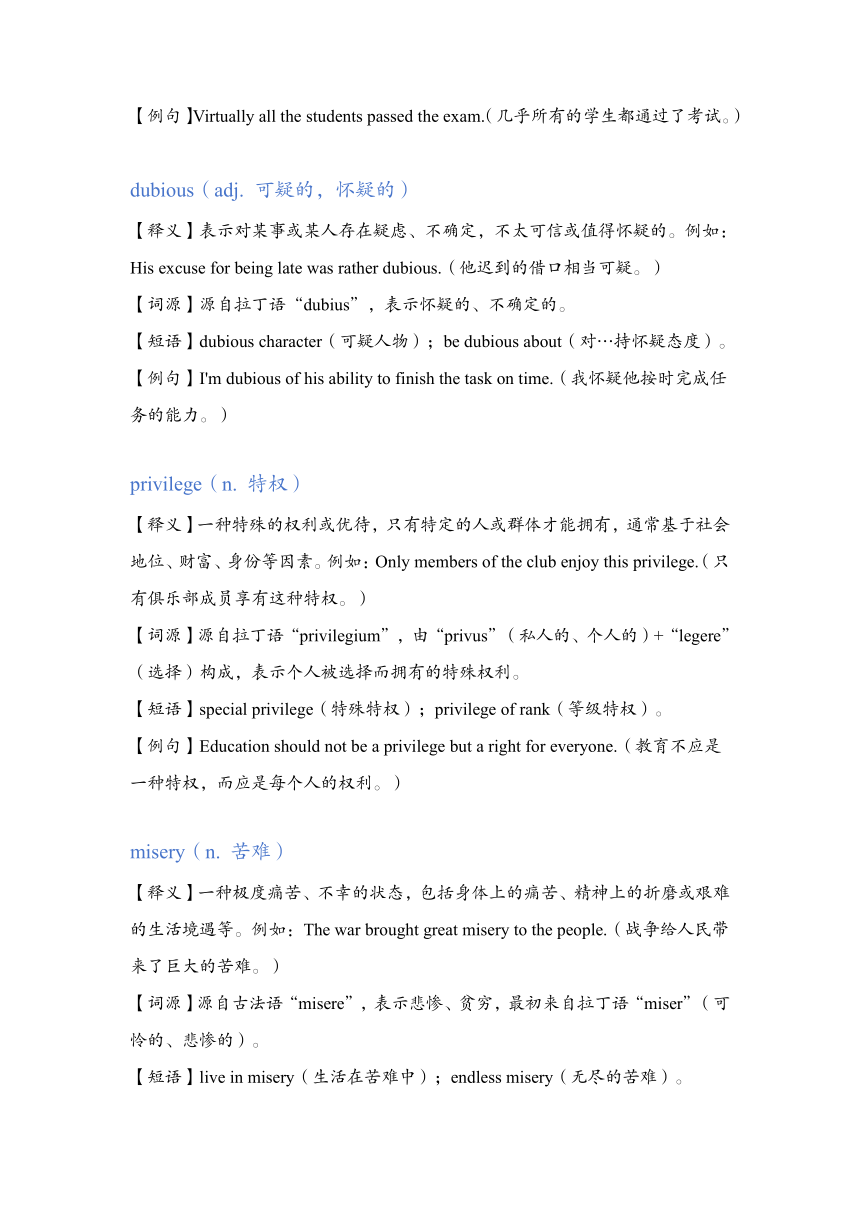
文档简介
新概念第三册
Lesson 41 Illusions of Pastoral peace
单词精讲
illusion n. 幻想,错觉
【释义】一种虚假的感觉或信念,与现实不符,可能是视觉、听觉等感官上的误导,也可以是心理上的错误认知。例如:The mirage in the desert is an illusion.(沙漠中的海市蜃楼是一种错觉。)
【词源】源自拉丁语“illudere”,表示嘲笑、戏弄,引申为欺骗感官或心智,从而产生幻想或错觉。
【短语】optical illusion(光学错觉);illusion of grandeur(妄自尊大的幻想)。
【例句】He had the illusion that he could fly.(他有自己能飞的幻想。)
pastoral(adj. 田园的)
【释义】与乡村生活、田园风光有关的,通常描绘乡村的宁静、质朴和自然之美,也可用于形容与乡村牧师或田园诗有关的事物。例如:The painting shows a pastoral scene with cows grazing in the field.(这幅画展现了一幅田园景象,奶牛在田野里吃草。)
【词源】源自拉丁语“pastor”,表示牧羊人,最初指与牧羊人生活或工作相关的,即田园的。
【短语】pastoral poetry(田园诗);pastoral life(田园生活)。
【例句】The author wrote a book about his pastoral experiences in the countryside.(作者写了一本关于他在乡村田园经历的书。)
breed (bred, bred)(v. 培育)
【释义】通过繁殖、饲养等方式使动植物产生特定的品种或特性;也可指培养(某种品质、习惯等)。例如:Farmers breed cows for high milk production.(农民为了高产奶量而培育奶牛。)
【词源】源自古英语“bredan”,表示生育、抚养后代的意思。
【短语】breed animals(饲养动物);breed out(在人工繁殖中消除不良品质)。
【例句】They breed roses to have different colors and shapes.(他们培育玫瑰以获得不同的颜色和形状。)
rapture(n. 欣喜)
【释义】一种极度的喜悦、兴奋或狂喜的感觉。例如:She was in rapture when she heard the good news.(当她听到好消息时,她欣喜若狂。)
【词源】源自拉丁语“rapere”,表示抢夺、抓走,最初用于宗教语境,表示灵魂被上帝抓走而进入狂喜状态。
【短语】be in rapture(欣喜若狂);go into raptures(变得欣喜若狂)。
【例句】The audience was in rapture at the end of the concert.(音乐会结束时观众欣喜若狂。)
extol(v. 赞美,颂扬)
【释义】高度赞扬、歌颂某人或某物的优点、成就等。例如:The poet extolled the beauty of nature in his poem.(诗人在他的诗中赞美了自然之美。)
【词源】源自拉丁语“extollere”,由“ex - ”(出、向上)+“tollere”(举起)构成,表示高高举起(某人或某物的声誉等),即赞美。
【短语】extol the virtues(颂扬美德);extol sb. as(把某人颂扬为)。
【例句】They extol their leader as a great hero.(他们把他们的领袖颂扬为伟大的英雄。)
superior(adj. 优越的)
【释义】表示在质量、数量、地位、能力等方面更好、更高或更优的;也可指有优越感的。例如:This brand is superior to others in quality.(这个品牌在质量上优于其他品牌。)
【词源】源自拉丁语“super”(上面、超过)+“ - ior”(比较级后缀),表示在上面的、更高的,即优越的。
【短语】superior quality(优质);feel superior(有优越感)。
【例句】Her work is of superior standard.(她的工作具有较高的水准。)
cockcrow(n. 鸡叫)
【释义】指公鸡打鸣发出的声音,也可表示黎明时分公鸡开始打鸣的时候。例如:At cockcrow, the farmers got up to start their day.(鸡叫的时候,农民们起床开始新的一天。)
【词源】由“cock”(公鸡)+“crow”(啼叫)组成,表示公鸡的啼叫声。
【短语】before cockcrow(黎明前)。
【例句】He woke up just after cockcrow.(鸡叫过后他就醒了。)
twitter(v.(鸟)吱吱叫,嘁嘁喳喳叫)
【释义】描述鸟儿发出的短促、轻快的叫声。例如:The birds twittered in the trees.(鸟儿在树上吱吱叫。)
【词源】可能是拟声词,模仿鸟叫声而创造的词。
【短语】
twitter away(叽叽喳喳地叫个不停)。
【例句】The sparrows twittered merrily outside the window.(麻雀在窗外欢快地叽叽喳喳叫着。)
glint(v. 闪烁)
【释义】指光线短暂而明亮地闪烁,通常是由于物体表面反射光线造成的。例如:The diamond glinted in the sunlight.(钻石在阳光下闪烁。)
【词源】可能源自斯堪的纳维亚语源,与闪烁的动作有关。
【短语】glint of light(闪烁的光)。
【例句】Her eyes glinted with excitement.(她的眼睛因兴奋而闪烁。)
pasture(n. 牧场)
【释义】一片用于放牧牲畜的草地或土地。例如:The cows were grazing in the pasture.(奶牛正在牧场上吃草。)
【词源】源自拉丁语“pastura”,表示放牧、饲养,名词形式表示放牧的地方,即牧场。
【短语】green pasture(绿色牧场);pasture land(牧场用地)。
【例句】They found a large pasture for their sheep.(他们为他们的羊找到了一大片牧场。)
idyllic(adj. 田园诗的)
【释义】极为美好、宁静、和谐的,通常用来形容乡村或自然环境,具有田园诗所描绘的那种理想特质。例如:They spent an idyllic weekend in the countryside.(他们在乡下度过了一个田园诗般的周末。)
【词源】源自希腊语“eidyllion”,最初是一种描写乡村生活的短诗,形容词形式表示具有田园诗特点的。
【短语】idyllic setting(田园诗般的环境)。
【例句】The small village has an idyllic charm.(这个小村庄有一种田园诗般的魅力。)
virtually(adv. 几乎,差不多)
【释义】表示非常接近某种状态或数量,但不完全是;在实际意义上,事实上。例如:He has virtually finished his work.(他几乎完成了他的工作。)
【词源】由“virtual”(形容词,实际上的、实质上的)+“ - ly”(副词后缀)构成。
【短语】virtually impossible(几乎不可能)。
【例句】Virtually all the students passed the exam.(几乎所有的学生都通过了考试。)
dubious(adj. 可疑的,怀疑的)
【释义】表示对某事或某人存在疑虑、不确定,不太可信或值得怀疑的。例如:His excuse for being late was rather dubious.(他迟到的借口相当可疑。)
【词源】源自拉丁语“dubius”,表示怀疑的、不确定的。
【短语】dubious character(可疑人物);be dubious about(对…持怀疑态度)。
【例句】I'm dubious of his ability to finish the task on time.(我怀疑他按时完成任务的能力。)
privilege(n. 特权)
【释义】一种特殊的权利或优待,只有特定的人或群体才能拥有,通常基于社会地位、财富、身份等因素。例如:Only members of the club enjoy this privilege.(只有俱乐部成员享有这种特权。)
【词源】源自拉丁语“privilegium”,由“privus”(私人的、个人的)+“legere”(选择)构成,表示个人被选择而拥有的特殊权利。
【短语】special privilege(特殊特权);privilege of rank(等级特权)。
【例句】Education should not be a privilege but a right for everyone.(教育不应是一种特权,而应是每个人的权利。)
misery(n. 苦难)
【释义】一种极度痛苦、不幸的状态,包括身体上的痛苦、精神上的折磨或艰难的生活境遇等。例如:The war brought great misery to the people.(战争给人民带来了巨大的苦难。)
【词源】源自古法语“misere”,表示悲惨、贫穷,最初来自拉丁语“miser”(可怜的、悲惨的)。
【短语】live in misery(生活在苦难中);endless misery(无尽的苦难)。
【例句】She tried to forget the miseries of her past.(她试图忘记过去的苦难。)
acquaintance(n. 熟人)
【释义】认识但不太熟悉的人;也可表示对某事的了解或认识(较浅的知识)。例如:He is just an acquaintance of mine.(他只是我的一个熟人。)
【词源】源自拉丁语“acquaintare”,表示使熟悉,名词形式表示熟悉的人或事,即熟人或对某事的了解。
【短语】make an acquaintance(结识某人);casual acquaintance(泛泛之交)。
【例句】I have some acquaintance with French history.(我对法国历史有一些了解。)
treat(n. 难得的乐事,享受)
【释义】指令人愉悦、特别的事情或体验,可以是食物、活动或某种待遇等。例如:Going to the spa is a real treat for her.(去做水疗对她来说是一件真正的乐事。)
【词源】源自古法语“traitier”,表示对待、处理,作为名词表示一种特殊的对待(即享受)。
【短语】a special treat(特别的享受);give sb. a treat(给某人一种享受)。
【例句】A box of chocolates is always a treat.(一盒巧克力总是一种享受。)
dweller(n. 居住者)
【释义】居住在某个地方的人,通常用于描述特定类型的居住者,如城市居住者(city dweller)或洞穴居住者(cave dweller)。例如:The city dwellers are used to the busy life.(城市居住者习惯了忙碌的生活。)
【词源】由“dwell”(动词,居住)+“ - er”(表示人的后缀)构成,表示居住的人。
【短语】slum dweller(贫民窟居住者);rural dweller(农村居住者)。
【例句】The forest dwellers have a deep connection with nature.(森林居住者与自然有着深厚的联系。)
stagger(v. 摇晃,蹒跚)
【释义】走路不稳,身体摇晃,通常是因为虚弱、醉酒、受伤或受到外力影响等原因。例如:The old man staggered along the street.(老人沿着街道蹒跚而行。)
【词源】源自古诺尔斯语“stakra”,表示推、挤,可能是因为被推挤而走路摇晃。
【短语】stagger to one's feet(摇摇晃晃地站起来);stagger about(蹒跚地走来走去)。
【例句】He staggered under the heavy load.(他在沉重的负荷下摇晃着。)
exotic(adj. 异乎寻常的,外来的)
【释义】来自异国他乡的,具有异国情调的;不寻常的、奇特的,与本地的或常见的事物不同。例如:The market sells exotic fruits from all over the world.(市场出售来自世界各地的异国水果。)
【词源】源自希腊语“exotikos”,表示外部的、外国的,最初指来自外国的事物具有奇特之处。
【短语】exotic plants(外来植物);exotic culture(异国文化)。
【例句】She wore an exotic dress to the party.(她穿着一件异国情调的裙子去参加聚会。)
glow(n. 白炽光)
【释义】一种柔和、稳定的光,通常是由于物体受热而发出的光亮,给人温暖、明亮的感觉。例如:The glow of the fireplace made the room cozy.(壁炉的白炽光使房间变得舒适。)
【词源】源自古英语“glowan”,表示发光、发热,名词形式表示发出的光。
【短语】a warm glow(温暖的光);glow of the sun(太阳的光辉)。
【例句】There was a soft glow in the dark room.(黑暗的房间里有一道柔和的光。)
descend(v. 缩进,隐藏)
【释义】您给出的这个释义有误。“descend”的常见释义为“下降;下来;下倾;遗传(财产、气质、权利)”等。例如:The plane began to descend.(飞机开始下降。)
【词源】源自古法语“descendre”,由“de - ”(向下)+“scendre”(攀登,与“scend”有关),表示向下攀登,即下降。
【短语】descend from(由…传下来;起源于);descend into(陷入,例如陷入混乱或黑暗等)。
【例句】The path descends steeply into the valley.(小路陡直地通向山谷。)
obstinately(adv. 固执地,顽固地)
【释义】以一种固执、顽固、不易被说服或改变的方式行事。例如:He obstinately refused to listen to any advice.(他顽固地拒绝听取任何建议。)
【词源】由“obstinate”(形容词,固执的、顽固的)+“ - ly”(副词后缀)构成,“obstinate”源自拉丁语“obstinatus”,表示坚定的、顽固的。
【短语】hold obstinately(顽固地坚持)。
【例句】She obstinately clung to her old ideas.(她固执地坚持她的旧观念。)
二、课文精讲
1.City born and city bred. I have always regarded the country as something you look at through a train window, or something you occasional visit during the weekend.我生在城市,长在城市,总认为乡村是透过火车车窗看到的那个样了,或偶尔周末去游玩一下的景象。
(1) city born 和 city bred
是两个由“名词+过去分词"构成的合成词,做形容词使用,可视为在city born前省略了现在分词being,作原因状语。在英语中,将形容词或形容词短语用作状语的情况很多。
(2) you look at ...和you occasionally visit ...
均为定语从句,分别修饰其前的something。在something 与两个定语从句间分别省略了关系连词that。
2.Most of my friends live in the city, yet they always go into rapturesat the mere mention of the country.我的许多朋友都住在城市,但他们只要一提起乡村,马上就会变得欣喜若狂。
(1) go into raptures变得极其喜爱,变得欣喜若狂。
如表示“对……极其喜爱”、“对……欣喜若狂”时,其后通常使用介词over或about,如:
They went into raptures at the good nerws .听到这个好消息后,他们欣喜若狂。
She went into ra ptures over the dresses they shoeed her着到他们展示给她的那些服装她欣喜若狂。
(2) at the nere mention of . .. 仅仅提到……
这里的介词at为“经”之意。
3.Even he still lives under the illusion that country life is somehow superior to town life.
即使他也仍存有幻觉,好像乡村生活就是比城市生活优越。
(1) be under the illusion有这样的错觉/幻觉。
其后that.引导一个同位语从句,如:
He is under the illusion that he is always right .他错以为他总是对的。
(2) be superior to . ..比……优越,胜过。
含比较之意,用于两人或两个事物之间的比较,如:
Many critics consider Browning superior to Tenn yson as apoet .
许多评论家认为,作为诗人,勃朗宁胜过丁尼生。
(3) be superior to还可引申为“不为……所影响”“拒绝”等意,用于此意时,介词可用above替换,如:
He 's superior to /above bribery .他拒牧贿赂。
当表示“在……方面胜过……"时,通常使用be superior in ...to ...或be superior to ... in ...这一结构,如:
He felt superior in mathematics to John .他觉得自己的数学比约翰强。
4. He is forever talking about the friendly people, the clean atmosphere, the closeness to nature and the gentle pace of living.他滔滔不绝地大谈友好的农民,洁净的空气,贴近大自然的环境和悠闲的生活节奏。
这里的副词forever 与正在进行时态的一同使用,表示出作者的不满、不快这样的感彩。always.lorever 、constantly 和continually 等副词伺进行时态的-同使用,除表示某事经常发生外,往往还表示说话人对发生的此类事情的不满,厌烦等.
5.Nothing can be compared, he maintains, with the first cockcrow, the twittering of birds at dawn, the sight of the rising sun glinting on the trees and pastures.他坚持认为,凌晨雄鸡第一声啼叫,黎明时分小鸟吱喳欢叫,冉冉升起的朝阳染红树木、牧场,此番美景无与伦比。
(1) compare . .. with ...将……同……相比。
用于两者问的比较,以发现其异同之处,如:
Compare this article with that one , and you'll see which is betier .
把这篇文章同那篇文章进行比较,你就会看出哪一篇文章更好些。
(2) he maintains 他坚持认为。
在句子中作插入成分。
(3) glinting on the trees and pastures
为现在分词短语,在句子中做介词宾语the rising sun的补足语。分词短语的这一用法﹐常用于某些介词宾语之后,如:
Here is a picture of our manager talking intimately withone of our staf f .
这是一张我们的经理同我们的一位工作人员亲切交谈的相片。
6.My friend fails to mention the long and friendless winter evenings in front of the TV -- virtually the only form of entertainment.我的朋友没有提到在电视机前度过的漫长寂寞的冬夜--电视是唯一的娱乐形式。
此处形容词friendless的使用为暗喻的一种修辞手法,即使用修饰入的形容词( friendless)来修饰事物(因为winter evezings不可能friendless)。
这样来使用的形容词为转类形容词( transferred epithet)。这种用法不仅使文字显得更为生动,而且更为简洁,比较:
They have spent on the project several nights duringwhich they did not sleep .
They s pent srverul sleepless nights on the project .
他们为了这个项目度过了好几个不眠之夜。
7.Why people are prepared to tolerate a four-hour journey each day for the dubious privilege of living in the country is beyond me.人们为什么情愿每天在路上奔波4个小时去换取值得怀疑的乡间的优点,我是无法理解的。
(1) why,连接副词,
在本句中引导一个主语从句。
(2) be prepared to do . ..愿意做……,准备好做……
文中表永“甘愿”的含义。其后为名词时,通常构成be prepared for . .. ,
如:We must be pre purrd for twists and turns .
我们必须准备好经受挫折。
(3 ) beyond me我所无法理解的。
8. They could be saved so much misery and expense if they chose to live in the city where they rightly belong.要是他们愿意住在本来属于他们的城市,则可以让他们省去诸多不便与节约大量开支。
本句使用了与现在事实不符的虚拟语气结构,
可译作"如果他们选择……,他们本可省掉诸多苦楚与开支”(事实是他们未做此选择,因此只能忍受……)。
在动词save后面可以使用双宾语结构。
将此句改为主动语态后为:To live in the city couldsave them so much misery and expense.如文中那样,本主动语态句了中的间接宾语them提前作了主语,而直接宾语miseryand cxpense 作为保留宾语留在了句子中。
9.If you can do without the few pastoral pleasures of the country,如果你愿舍弃乡下生活那一点点乐趣的话,
do without没有……也行,如:
Perople can do without a lot of things,tut they cannot dowithout food .
有许多东西人们没有也能过得去,但是没有食物则不行.
有时用来表达“用不着”之意,如:
We can do zwithout y)ur criticisms ,thank wou .
我们用不着你的批评,多谢了。
10. Some of my acquaintances in the country come up to town once or twice a year to visit the theatre as a special treat.我在乡村有一些熟人,他们每年进城来看一回或几回戏,并把此看作一种特殊的享受。
come up to town中up为副词,其反义词为down:
The turists went up /down the hill .
旅游者上/下了山。
The prices have gone up / down .物价上涨/下降了
还主要用来表示:
(1)去城市用up,去乡下用down,如:
He went up to the city .
他进城了。
He went down to the country.
他下乡了。
(2)向北用up,向南用down,如:
The swallow flies up north in spring and down south in autumn .
燕子春天往北飞,秋天往南飞。
(3)入校用up,离校用down,如:
He went up to Beijing University last year .
他去年进了北京大学。
Shelley was sent down from Oxford .雪莱被牛津大学开除过﹑
11. For them this is a major operation which involves considerable planning.看戏在(对)他们是件大事,需要精心计划。
major operation、considerable planning 与前句中的special treat这些用词均具有夸张的色彩,产生诙谐效果,与结果(即下·句内容)一起,更强调在农村生活的不便,
12.As the play draws to its close, they wonder whether they will ever catch that last train home.当戏快演完时,他们又为是否能赶上末班火车回家而犯愁。
draw to a close 临近结束,这里its指“戏的”,如:
The summer vacation is drawing to a close .暑假郎将结束。
13. The city dweller never experiences anxieties of this sort.这种焦虑,城里人是从未体验过的。
anxieties of this sort这种焦虑,
一般情况下,在 this sort ... .this kind of ...和 this type of ...这类的结构中,介词of后的名河多用单数形式.如:
this kind of cigarette这种烟
this kind of car这种汽车
this type of sentence这种句子类型
当名词为复数时,如文中那样,常常将sort . kind、type等故置在介词of之后。
14. The latest exhibitions, films, or plays are only a short bus ride away.坐公共汽车几站路,就可看到最新的展览、电影、戏剧。
a short bus ride away乘公共汽车一会儿就到。
15. There is so much variety that you never have to make do with second best.物品品种繁多,从来不必用二等品来凑合。
(1) make do with以……将就,以……勉强应对,如:
The armchairs haven't yet arrived so xwe have to make dozwith these stools .
扶手椅还未到,我们只得用凳子将就了。
(2) second best第二好的东西,仅次于最好的东西。
16. Nor is the city without its moments of beauty.城市也并非没有良辰美景。
nor并非,也不。为否定词,用于句首时,句子的主语与谓语动词要倒装。
17. There is something comforting about the warm glow shed by advertisements on cold wet winter nights.寒冷潮湿的冬夜里,广告灯箱发出的暖光,会给人某种安慰。
comforting 令人慰藉的. 为形容词,由于somethjng为不定代词,因此需将其置于something之后修饰该词。
18. Few things could be more impressive than the peace that descends on deserted city streets at weekends.周末,空旷的街市笼罩着一种宁静的气氛,没有什么能比此时的宁静更令人难忘了。
(1) fcw things没有什么东西。
few用于表示基本否定的含义﹐意即“没有什么能比……更令人难忘”。
(2)两个that均为关系代词,
和关系副词when都用来引导定语从句,分别修饰peace 、wcekends 和 the thousands。句子中的theihousands指成千上万的人。
19.It has always been a mystery to me why city dwellers, who appreciate all these things,城里人对这一切心里很明白,
it为先行词,作形式主语。连接副词why引导的从句作句于的逻辑主语。
who关系代词,引导一个非限制性定语从句,修饰city dwellers,起到对其进一-步说明的作用。
Lesson 41 Illusions of Pastoral peace
单词精讲
illusion n. 幻想,错觉
【释义】一种虚假的感觉或信念,与现实不符,可能是视觉、听觉等感官上的误导,也可以是心理上的错误认知。例如:The mirage in the desert is an illusion.(沙漠中的海市蜃楼是一种错觉。)
【词源】源自拉丁语“illudere”,表示嘲笑、戏弄,引申为欺骗感官或心智,从而产生幻想或错觉。
【短语】optical illusion(光学错觉);illusion of grandeur(妄自尊大的幻想)。
【例句】He had the illusion that he could fly.(他有自己能飞的幻想。)
pastoral(adj. 田园的)
【释义】与乡村生活、田园风光有关的,通常描绘乡村的宁静、质朴和自然之美,也可用于形容与乡村牧师或田园诗有关的事物。例如:The painting shows a pastoral scene with cows grazing in the field.(这幅画展现了一幅田园景象,奶牛在田野里吃草。)
【词源】源自拉丁语“pastor”,表示牧羊人,最初指与牧羊人生活或工作相关的,即田园的。
【短语】pastoral poetry(田园诗);pastoral life(田园生活)。
【例句】The author wrote a book about his pastoral experiences in the countryside.(作者写了一本关于他在乡村田园经历的书。)
breed (bred, bred)(v. 培育)
【释义】通过繁殖、饲养等方式使动植物产生特定的品种或特性;也可指培养(某种品质、习惯等)。例如:Farmers breed cows for high milk production.(农民为了高产奶量而培育奶牛。)
【词源】源自古英语“bredan”,表示生育、抚养后代的意思。
【短语】breed animals(饲养动物);breed out(在人工繁殖中消除不良品质)。
【例句】They breed roses to have different colors and shapes.(他们培育玫瑰以获得不同的颜色和形状。)
rapture(n. 欣喜)
【释义】一种极度的喜悦、兴奋或狂喜的感觉。例如:She was in rapture when she heard the good news.(当她听到好消息时,她欣喜若狂。)
【词源】源自拉丁语“rapere”,表示抢夺、抓走,最初用于宗教语境,表示灵魂被上帝抓走而进入狂喜状态。
【短语】be in rapture(欣喜若狂);go into raptures(变得欣喜若狂)。
【例句】The audience was in rapture at the end of the concert.(音乐会结束时观众欣喜若狂。)
extol(v. 赞美,颂扬)
【释义】高度赞扬、歌颂某人或某物的优点、成就等。例如:The poet extolled the beauty of nature in his poem.(诗人在他的诗中赞美了自然之美。)
【词源】源自拉丁语“extollere”,由“ex - ”(出、向上)+“tollere”(举起)构成,表示高高举起(某人或某物的声誉等),即赞美。
【短语】extol the virtues(颂扬美德);extol sb. as(把某人颂扬为)。
【例句】They extol their leader as a great hero.(他们把他们的领袖颂扬为伟大的英雄。)
superior(adj. 优越的)
【释义】表示在质量、数量、地位、能力等方面更好、更高或更优的;也可指有优越感的。例如:This brand is superior to others in quality.(这个品牌在质量上优于其他品牌。)
【词源】源自拉丁语“super”(上面、超过)+“ - ior”(比较级后缀),表示在上面的、更高的,即优越的。
【短语】superior quality(优质);feel superior(有优越感)。
【例句】Her work is of superior standard.(她的工作具有较高的水准。)
cockcrow(n. 鸡叫)
【释义】指公鸡打鸣发出的声音,也可表示黎明时分公鸡开始打鸣的时候。例如:At cockcrow, the farmers got up to start their day.(鸡叫的时候,农民们起床开始新的一天。)
【词源】由“cock”(公鸡)+“crow”(啼叫)组成,表示公鸡的啼叫声。
【短语】before cockcrow(黎明前)。
【例句】He woke up just after cockcrow.(鸡叫过后他就醒了。)
twitter(v.(鸟)吱吱叫,嘁嘁喳喳叫)
【释义】描述鸟儿发出的短促、轻快的叫声。例如:The birds twittered in the trees.(鸟儿在树上吱吱叫。)
【词源】可能是拟声词,模仿鸟叫声而创造的词。
【短语】
twitter away(叽叽喳喳地叫个不停)。
【例句】The sparrows twittered merrily outside the window.(麻雀在窗外欢快地叽叽喳喳叫着。)
glint(v. 闪烁)
【释义】指光线短暂而明亮地闪烁,通常是由于物体表面反射光线造成的。例如:The diamond glinted in the sunlight.(钻石在阳光下闪烁。)
【词源】可能源自斯堪的纳维亚语源,与闪烁的动作有关。
【短语】glint of light(闪烁的光)。
【例句】Her eyes glinted with excitement.(她的眼睛因兴奋而闪烁。)
pasture(n. 牧场)
【释义】一片用于放牧牲畜的草地或土地。例如:The cows were grazing in the pasture.(奶牛正在牧场上吃草。)
【词源】源自拉丁语“pastura”,表示放牧、饲养,名词形式表示放牧的地方,即牧场。
【短语】green pasture(绿色牧场);pasture land(牧场用地)。
【例句】They found a large pasture for their sheep.(他们为他们的羊找到了一大片牧场。)
idyllic(adj. 田园诗的)
【释义】极为美好、宁静、和谐的,通常用来形容乡村或自然环境,具有田园诗所描绘的那种理想特质。例如:They spent an idyllic weekend in the countryside.(他们在乡下度过了一个田园诗般的周末。)
【词源】源自希腊语“eidyllion”,最初是一种描写乡村生活的短诗,形容词形式表示具有田园诗特点的。
【短语】idyllic setting(田园诗般的环境)。
【例句】The small village has an idyllic charm.(这个小村庄有一种田园诗般的魅力。)
virtually(adv. 几乎,差不多)
【释义】表示非常接近某种状态或数量,但不完全是;在实际意义上,事实上。例如:He has virtually finished his work.(他几乎完成了他的工作。)
【词源】由“virtual”(形容词,实际上的、实质上的)+“ - ly”(副词后缀)构成。
【短语】virtually impossible(几乎不可能)。
【例句】Virtually all the students passed the exam.(几乎所有的学生都通过了考试。)
dubious(adj. 可疑的,怀疑的)
【释义】表示对某事或某人存在疑虑、不确定,不太可信或值得怀疑的。例如:His excuse for being late was rather dubious.(他迟到的借口相当可疑。)
【词源】源自拉丁语“dubius”,表示怀疑的、不确定的。
【短语】dubious character(可疑人物);be dubious about(对…持怀疑态度)。
【例句】I'm dubious of his ability to finish the task on time.(我怀疑他按时完成任务的能力。)
privilege(n. 特权)
【释义】一种特殊的权利或优待,只有特定的人或群体才能拥有,通常基于社会地位、财富、身份等因素。例如:Only members of the club enjoy this privilege.(只有俱乐部成员享有这种特权。)
【词源】源自拉丁语“privilegium”,由“privus”(私人的、个人的)+“legere”(选择)构成,表示个人被选择而拥有的特殊权利。
【短语】special privilege(特殊特权);privilege of rank(等级特权)。
【例句】Education should not be a privilege but a right for everyone.(教育不应是一种特权,而应是每个人的权利。)
misery(n. 苦难)
【释义】一种极度痛苦、不幸的状态,包括身体上的痛苦、精神上的折磨或艰难的生活境遇等。例如:The war brought great misery to the people.(战争给人民带来了巨大的苦难。)
【词源】源自古法语“misere”,表示悲惨、贫穷,最初来自拉丁语“miser”(可怜的、悲惨的)。
【短语】live in misery(生活在苦难中);endless misery(无尽的苦难)。
【例句】She tried to forget the miseries of her past.(她试图忘记过去的苦难。)
acquaintance(n. 熟人)
【释义】认识但不太熟悉的人;也可表示对某事的了解或认识(较浅的知识)。例如:He is just an acquaintance of mine.(他只是我的一个熟人。)
【词源】源自拉丁语“acquaintare”,表示使熟悉,名词形式表示熟悉的人或事,即熟人或对某事的了解。
【短语】make an acquaintance(结识某人);casual acquaintance(泛泛之交)。
【例句】I have some acquaintance with French history.(我对法国历史有一些了解。)
treat(n. 难得的乐事,享受)
【释义】指令人愉悦、特别的事情或体验,可以是食物、活动或某种待遇等。例如:Going to the spa is a real treat for her.(去做水疗对她来说是一件真正的乐事。)
【词源】源自古法语“traitier”,表示对待、处理,作为名词表示一种特殊的对待(即享受)。
【短语】a special treat(特别的享受);give sb. a treat(给某人一种享受)。
【例句】A box of chocolates is always a treat.(一盒巧克力总是一种享受。)
dweller(n. 居住者)
【释义】居住在某个地方的人,通常用于描述特定类型的居住者,如城市居住者(city dweller)或洞穴居住者(cave dweller)。例如:The city dwellers are used to the busy life.(城市居住者习惯了忙碌的生活。)
【词源】由“dwell”(动词,居住)+“ - er”(表示人的后缀)构成,表示居住的人。
【短语】slum dweller(贫民窟居住者);rural dweller(农村居住者)。
【例句】The forest dwellers have a deep connection with nature.(森林居住者与自然有着深厚的联系。)
stagger(v. 摇晃,蹒跚)
【释义】走路不稳,身体摇晃,通常是因为虚弱、醉酒、受伤或受到外力影响等原因。例如:The old man staggered along the street.(老人沿着街道蹒跚而行。)
【词源】源自古诺尔斯语“stakra”,表示推、挤,可能是因为被推挤而走路摇晃。
【短语】stagger to one's feet(摇摇晃晃地站起来);stagger about(蹒跚地走来走去)。
【例句】He staggered under the heavy load.(他在沉重的负荷下摇晃着。)
exotic(adj. 异乎寻常的,外来的)
【释义】来自异国他乡的,具有异国情调的;不寻常的、奇特的,与本地的或常见的事物不同。例如:The market sells exotic fruits from all over the world.(市场出售来自世界各地的异国水果。)
【词源】源自希腊语“exotikos”,表示外部的、外国的,最初指来自外国的事物具有奇特之处。
【短语】exotic plants(外来植物);exotic culture(异国文化)。
【例句】She wore an exotic dress to the party.(她穿着一件异国情调的裙子去参加聚会。)
glow(n. 白炽光)
【释义】一种柔和、稳定的光,通常是由于物体受热而发出的光亮,给人温暖、明亮的感觉。例如:The glow of the fireplace made the room cozy.(壁炉的白炽光使房间变得舒适。)
【词源】源自古英语“glowan”,表示发光、发热,名词形式表示发出的光。
【短语】a warm glow(温暖的光);glow of the sun(太阳的光辉)。
【例句】There was a soft glow in the dark room.(黑暗的房间里有一道柔和的光。)
descend(v. 缩进,隐藏)
【释义】您给出的这个释义有误。“descend”的常见释义为“下降;下来;下倾;遗传(财产、气质、权利)”等。例如:The plane began to descend.(飞机开始下降。)
【词源】源自古法语“descendre”,由“de - ”(向下)+“scendre”(攀登,与“scend”有关),表示向下攀登,即下降。
【短语】descend from(由…传下来;起源于);descend into(陷入,例如陷入混乱或黑暗等)。
【例句】The path descends steeply into the valley.(小路陡直地通向山谷。)
obstinately(adv. 固执地,顽固地)
【释义】以一种固执、顽固、不易被说服或改变的方式行事。例如:He obstinately refused to listen to any advice.(他顽固地拒绝听取任何建议。)
【词源】由“obstinate”(形容词,固执的、顽固的)+“ - ly”(副词后缀)构成,“obstinate”源自拉丁语“obstinatus”,表示坚定的、顽固的。
【短语】hold obstinately(顽固地坚持)。
【例句】She obstinately clung to her old ideas.(她固执地坚持她的旧观念。)
二、课文精讲
1.City born and city bred. I have always regarded the country as something you look at through a train window, or something you occasional visit during the weekend.我生在城市,长在城市,总认为乡村是透过火车车窗看到的那个样了,或偶尔周末去游玩一下的景象。
(1) city born 和 city bred
是两个由“名词+过去分词"构成的合成词,做形容词使用,可视为在city born前省略了现在分词being,作原因状语。在英语中,将形容词或形容词短语用作状语的情况很多。
(2) you look at ...和you occasionally visit ...
均为定语从句,分别修饰其前的something。在something 与两个定语从句间分别省略了关系连词that。
2.Most of my friends live in the city, yet they always go into rapturesat the mere mention of the country.我的许多朋友都住在城市,但他们只要一提起乡村,马上就会变得欣喜若狂。
(1) go into raptures变得极其喜爱,变得欣喜若狂。
如表示“对……极其喜爱”、“对……欣喜若狂”时,其后通常使用介词over或about,如:
They went into raptures at the good nerws .听到这个好消息后,他们欣喜若狂。
She went into ra ptures over the dresses they shoeed her着到他们展示给她的那些服装她欣喜若狂。
(2) at the nere mention of . .. 仅仅提到……
这里的介词at为“经”之意。
3.Even he still lives under the illusion that country life is somehow superior to town life.
即使他也仍存有幻觉,好像乡村生活就是比城市生活优越。
(1) be under the illusion有这样的错觉/幻觉。
其后that.引导一个同位语从句,如:
He is under the illusion that he is always right .他错以为他总是对的。
(2) be superior to . ..比……优越,胜过。
含比较之意,用于两人或两个事物之间的比较,如:
Many critics consider Browning superior to Tenn yson as apoet .
许多评论家认为,作为诗人,勃朗宁胜过丁尼生。
(3) be superior to还可引申为“不为……所影响”“拒绝”等意,用于此意时,介词可用above替换,如:
He 's superior to /above bribery .他拒牧贿赂。
当表示“在……方面胜过……"时,通常使用be superior in ...to ...或be superior to ... in ...这一结构,如:
He felt superior in mathematics to John .他觉得自己的数学比约翰强。
4. He is forever talking about the friendly people, the clean atmosphere, the closeness to nature and the gentle pace of living.他滔滔不绝地大谈友好的农民,洁净的空气,贴近大自然的环境和悠闲的生活节奏。
这里的副词forever 与正在进行时态的一同使用,表示出作者的不满、不快这样的感彩。always.lorever 、constantly 和continually 等副词伺进行时态的-同使用,除表示某事经常发生外,往往还表示说话人对发生的此类事情的不满,厌烦等.
5.Nothing can be compared, he maintains, with the first cockcrow, the twittering of birds at dawn, the sight of the rising sun glinting on the trees and pastures.他坚持认为,凌晨雄鸡第一声啼叫,黎明时分小鸟吱喳欢叫,冉冉升起的朝阳染红树木、牧场,此番美景无与伦比。
(1) compare . .. with ...将……同……相比。
用于两者问的比较,以发现其异同之处,如:
Compare this article with that one , and you'll see which is betier .
把这篇文章同那篇文章进行比较,你就会看出哪一篇文章更好些。
(2) he maintains 他坚持认为。
在句子中作插入成分。
(3) glinting on the trees and pastures
为现在分词短语,在句子中做介词宾语the rising sun的补足语。分词短语的这一用法﹐常用于某些介词宾语之后,如:
Here is a picture of our manager talking intimately withone of our staf f .
这是一张我们的经理同我们的一位工作人员亲切交谈的相片。
6.My friend fails to mention the long and friendless winter evenings in front of the TV -- virtually the only form of entertainment.我的朋友没有提到在电视机前度过的漫长寂寞的冬夜--电视是唯一的娱乐形式。
此处形容词friendless的使用为暗喻的一种修辞手法,即使用修饰入的形容词( friendless)来修饰事物(因为winter evezings不可能friendless)。
这样来使用的形容词为转类形容词( transferred epithet)。这种用法不仅使文字显得更为生动,而且更为简洁,比较:
They have spent on the project several nights duringwhich they did not sleep .
They s pent srverul sleepless nights on the project .
他们为了这个项目度过了好几个不眠之夜。
7.Why people are prepared to tolerate a four-hour journey each day for the dubious privilege of living in the country is beyond me.人们为什么情愿每天在路上奔波4个小时去换取值得怀疑的乡间的优点,我是无法理解的。
(1) why,连接副词,
在本句中引导一个主语从句。
(2) be prepared to do . ..愿意做……,准备好做……
文中表永“甘愿”的含义。其后为名词时,通常构成be prepared for . .. ,
如:We must be pre purrd for twists and turns .
我们必须准备好经受挫折。
(3 ) beyond me我所无法理解的。
8. They could be saved so much misery and expense if they chose to live in the city where they rightly belong.要是他们愿意住在本来属于他们的城市,则可以让他们省去诸多不便与节约大量开支。
本句使用了与现在事实不符的虚拟语气结构,
可译作"如果他们选择……,他们本可省掉诸多苦楚与开支”(事实是他们未做此选择,因此只能忍受……)。
在动词save后面可以使用双宾语结构。
将此句改为主动语态后为:To live in the city couldsave them so much misery and expense.如文中那样,本主动语态句了中的间接宾语them提前作了主语,而直接宾语miseryand cxpense 作为保留宾语留在了句子中。
9.If you can do without the few pastoral pleasures of the country,如果你愿舍弃乡下生活那一点点乐趣的话,
do without没有……也行,如:
Perople can do without a lot of things,tut they cannot dowithout food .
有许多东西人们没有也能过得去,但是没有食物则不行.
有时用来表达“用不着”之意,如:
We can do zwithout y)ur criticisms ,thank wou .
我们用不着你的批评,多谢了。
10. Some of my acquaintances in the country come up to town once or twice a year to visit the theatre as a special treat.我在乡村有一些熟人,他们每年进城来看一回或几回戏,并把此看作一种特殊的享受。
come up to town中up为副词,其反义词为down:
The turists went up /down the hill .
旅游者上/下了山。
The prices have gone up / down .物价上涨/下降了
还主要用来表示:
(1)去城市用up,去乡下用down,如:
He went up to the city .
他进城了。
He went down to the country.
他下乡了。
(2)向北用up,向南用down,如:
The swallow flies up north in spring and down south in autumn .
燕子春天往北飞,秋天往南飞。
(3)入校用up,离校用down,如:
He went up to Beijing University last year .
他去年进了北京大学。
Shelley was sent down from Oxford .雪莱被牛津大学开除过﹑
11. For them this is a major operation which involves considerable planning.看戏在(对)他们是件大事,需要精心计划。
major operation、considerable planning 与前句中的special treat这些用词均具有夸张的色彩,产生诙谐效果,与结果(即下·句内容)一起,更强调在农村生活的不便,
12.As the play draws to its close, they wonder whether they will ever catch that last train home.当戏快演完时,他们又为是否能赶上末班火车回家而犯愁。
draw to a close 临近结束,这里its指“戏的”,如:
The summer vacation is drawing to a close .暑假郎将结束。
13. The city dweller never experiences anxieties of this sort.这种焦虑,城里人是从未体验过的。
anxieties of this sort这种焦虑,
一般情况下,在 this sort ... .this kind of ...和 this type of ...这类的结构中,介词of后的名河多用单数形式.如:
this kind of cigarette这种烟
this kind of car这种汽车
this type of sentence这种句子类型
当名词为复数时,如文中那样,常常将sort . kind、type等故置在介词of之后。
14. The latest exhibitions, films, or plays are only a short bus ride away.坐公共汽车几站路,就可看到最新的展览、电影、戏剧。
a short bus ride away乘公共汽车一会儿就到。
15. There is so much variety that you never have to make do with second best.物品品种繁多,从来不必用二等品来凑合。
(1) make do with以……将就,以……勉强应对,如:
The armchairs haven't yet arrived so xwe have to make dozwith these stools .
扶手椅还未到,我们只得用凳子将就了。
(2) second best第二好的东西,仅次于最好的东西。
16. Nor is the city without its moments of beauty.城市也并非没有良辰美景。
nor并非,也不。为否定词,用于句首时,句子的主语与谓语动词要倒装。
17. There is something comforting about the warm glow shed by advertisements on cold wet winter nights.寒冷潮湿的冬夜里,广告灯箱发出的暖光,会给人某种安慰。
comforting 令人慰藉的. 为形容词,由于somethjng为不定代词,因此需将其置于something之后修饰该词。
18. Few things could be more impressive than the peace that descends on deserted city streets at weekends.周末,空旷的街市笼罩着一种宁静的气氛,没有什么能比此时的宁静更令人难忘了。
(1) fcw things没有什么东西。
few用于表示基本否定的含义﹐意即“没有什么能比……更令人难忘”。
(2)两个that均为关系代词,
和关系副词when都用来引导定语从句,分别修饰peace 、wcekends 和 the thousands。句子中的theihousands指成千上万的人。
19.It has always been a mystery to me why city dwellers, who appreciate all these things,城里人对这一切心里很明白,
it为先行词,作形式主语。连接副词why引导的从句作句于的逻辑主语。
who关系代词,引导一个非限制性定语从句,修饰city dwellers,起到对其进一-步说明的作用。
同课章节目录
